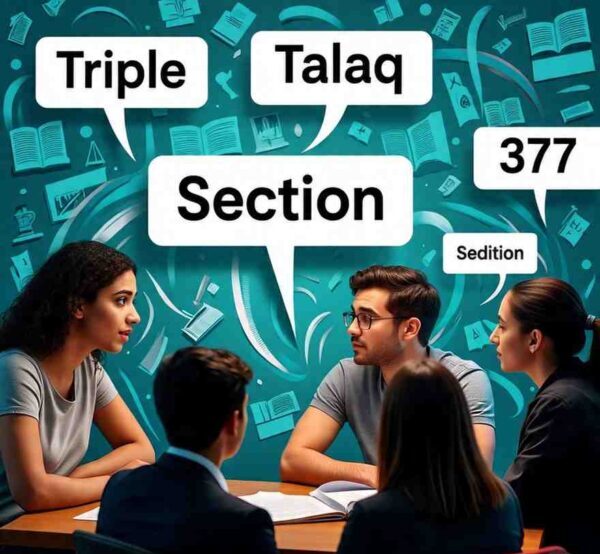Discover how the CBSE syllabus upgrade now includes crucial legal topics like Triple Talaq, Section 377, and sedition. Learn why these additions make legal studies more relevant, engaging, and essential for today’s students.
Introduction
In a major move to modernize and make legal education more relevant for Indian students, the Central Board of Secondary Education (CBSE) has revamped its syllabus to include contemporary and socially significant topics such as Triple Talaq, Section 377, and sedition. This upgrade reflects an effort to bring critical legal issues into the classroom, encouraging students to engage with the law as it impacts real lives and society. The inclusion of these edgy and often debated topics marks a shift towards making legal studies not only informative but also thought-provoking and current.
Why This Upgrade Matters
Traditionally, legal studies in school have focused on foundational laws and constitutional basics, often steering clear of controversial or evolving issues. However, the legal landscape in India is dynamic, shaped by progressive judgments, social movements, and legislative reforms. With the new syllabus, students will study landmark laws and landmark legal battles that have influenced society deeply.
This curriculum enhancement aims to create awareness among young minds about their rights, responsibilities, and the social context of laws. It prepares students to be better informed citizens who can critically analyze legal issues rather than simply memorizing statutes.
Triple Talaq: Understanding a Landmark Social Reform
One of the most debated topics now included in the syllabus is Triple Talaq, officially known as talaq-e-biddat. Under this custom, a Muslim man could instantly divorce his wife by repeating the word “talaq” three times in a row. Although it had been in practice for decades, it faced growing criticism for being arbitrary and unfair towards women.
In 2017, the Supreme Court of India declared the practice unconstitutional and banned it, calling it a violation of Muslim women’s fundamental rights. Following this, the government enacted the Muslim Women (Protection of Rights on Marriage) Act, 2019, criminalizing the practice with punishments for offenders.
Including Triple Talaq in the syllabus helps students understand not only the legal dimensions but also the intersection of religion, gender justice, and constitutional rights. It introduces them to how social reforms are achieved through the legal system, and the ongoing challenges of balancing personal laws with human rights.
Section 377: Decriminalizing Love and Identity
Another revolutionary topic is Section 377 of the Indian Penal Code (IPC) — a colonial-era law that criminalized consensual same-sex relations as “unnatural offenses.” For decades, this section was used to persecute and marginalize the LGBTQ+ community in India.
The Supreme Court’s landmark verdict in 2018 decriminalized consensual homosexual acts between adults, affirming the rights to equality, privacy, and dignity. This judgment was hailed as a giant step towards inclusion and non-discrimination.
By studying Section 377, students get to explore how laws evolve with changing societal values and constitutional interpretation. It opens up discussions about human rights, the importance of privacy, and respect for diverse sexual orientations. This inclusion promotes empathy and social acceptance alongside legal knowledge.
Sedition: Law, Democracy, and Free Speech
The inclusion of sedition laws in the syllabus is particularly relevant given the ongoing debates about freedom of speech in India. Section 124A of the IPC defines sedition as any act or speech that incites hatred or contempt against the government.
While sedition laws were originally meant to curb violent rebellion against colonial rulers, today they are often criticized for being used to suppress dissent and curb democratic freedoms. Notable sedition cases have triggered extensive public debate over maintaining national security while respecting individual liberties.
By studying sedition, students can critically examine the fine line between maintaining law and order and protecting democratic values like free speech. They can understand how legal provisions can be misused or challenged, and why judicial oversight is essential in safeguarding constitutional freedoms.
Impact on Students and Society
The addition of these topics transforms legal studies from a textbook exercise into a window to contemporary social realities. It encourages students to think critically about the law’s role in social justice, individual freedoms, and democracy.
By engaging with real-life legal issues, students become more aware citizens who can participate meaningfully in societal debates. In a democratic society, legal knowledge is key to being a responsible citizen, making this awareness vital.
Moreover, learning about these laws also fosters sensitivity towards marginalized groups, gender equality, and democratic values — shaping students not only as informed individuals but as empathetic members of society.
Conclusion
Updating the legal studies curriculum to cover Triple Talaq, Section 377, and sedition is a significant and needed initiative by the CBSE. It aligns education with the realities of modern India and encourages students to engage deeply with the law as a living instrument of social change.
As these young learners explore the intersections of law, society, and human rights, they will be better equipped to understand and shape the democratic future of India. Legal studies are no longer just about rules; they are about the lives those rules affect and the justice those rules strive to achieve.
This edgy syllabus promises to make legal education more exciting, relevant, and impactful than ever before.

























